seasonal movie guide
Recent accidental discovery: watching the Coen brothers' icy classic Fargo on a 38 degree day instantly makes you feel roughly 10 degrees cooler. Here's our list of favourite seasonal movies, guaranteed to bring the barometer down a notch.
Recent accidental discovery: watching the Coen brothers' icy classic Fargo on a 38 degree day instantly makes you feel roughly 10 degrees cooler. Fact. It made us start thinking about all the other wintery movies we could watch, and how we should make the inverse list of summery movies for when we're huddled under two doonas on the couch sipping lukewarm broth in 4 months' time.
And then we though, "To hell with it, we'll just get movie matron Rowena Grant-Frost to do it for us."
This is the result of our season-by-season body temperature-altering movie guide.
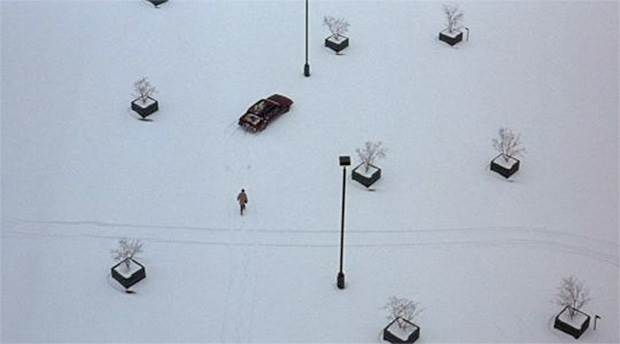
WINTER:
Meet Me in St Louis
The fact that people still seem to think "Have Yourself A Merry Little Christmas"—originally performed in Meet Me In St Louis—belongs on the same Christmas compilation CD as "Rudolph the Red-Nosed Reindeer" speaks to the enduring appeal of Judy Garland and her ability to transcend the straight-up terribleness of the lyrics. (Have you even listened to them? My gawwd.) It's a sad song! Sad songs have no place at Christmas! But it's also a great moment in the MGM musical.
The Shining
Writers are always looking for totally sweet gigs to help supplement their totally sour incomes. This is a truth, and no writer, except for maybe J.K. Rowling and that vampire woman, will deny it. So I sympathised with Jack Torrance after he accepted the winter caretaker job at the Overlook Hotel. It looked like a totally sweet gig! But all work and no play makes Jack a dull boy, and "dull" turns out to mean "murderous," and then it all ends badly... Jack turns into a human snow cone in the end. This is a cautionary tale for all writers.
Fargo
My favourite scene in Fargo involves the weather. In it, Marge Gunderson is talking to the man she has just arrested for murder, who is sitting in her back seat of her patrol car. She speaks with sadness of the events that have happened, of the people who have died and the selfishness and pointlessness of the crimes he has committed. "And here y'are," Marge says, "and it's a beautiful day." She stops and looks in her side mirror as the sound of sirens grows closer. Soon the film cuts to a shot from Marge's perspective as she looks out the front windscreen at the world outside. It's a bleak, snowy, horrible day. But Marge thinks it's beautiful. Naww.
The Thing
The number of women in The Thing is approximately equal to zero. This is OK for the following reasons: 1. Most of the 12 men who go to Antarctica end up dying, paranoid or ravaged by aliens, and 2. I have strong suspicions the alien might be a lady.
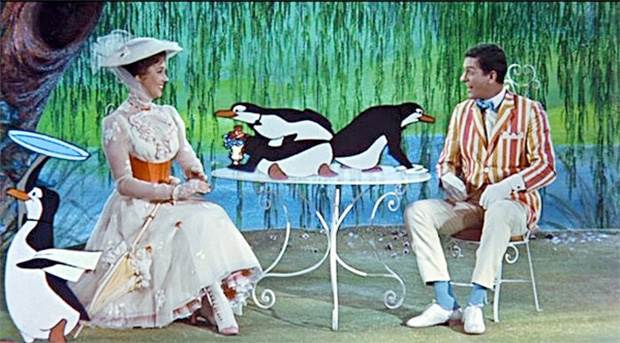
SPRING:
Another Year
Mike Leigh's films are either harrowing and ravaging or delightful and whimsical. Another Year, thankfully, is more like the latter, although it isn't without emotional complexity or darkness. The film takes place over a year and involves a couple and their garden allotment. So even when things get a bit sad, rest assured the characters are eating vegetables.
March Of The Penguins
Yes, I know this film is set in Antarctica, so it should be an obvious choice as a winter film. But Antarctica has seasons too, OK? Antarctica even has SUMMER! And the best bits in March Of The Penguins were the bits set in Spring, when the fat, tweety, funny-looking baby penguins emerge from their egg houses. Spring is the season for cute things. Scientific fact.
Mary Poppins
Part of the joy and optimism at the heart of Mary Poppins is the joy and optimism only Londoners can understand: the end of winter! The beginning of spring! The possibility that it might stop raining and you will get to see the sun or experience daylight! The film is set in the spring of 1910, when women's suffrage was on the move (first-wave feminism, represent), King Edward VII was still on the throne (but not for long, buddy), and nannies are recruited from rain clouds.
Easter Parade
This is maybe the most shameless attempt at creating a set of Easter carols ever, but you've got to hand it to Irving Berlin. The dude could write a song about pretty much anything–y ou can also thank him for "White Christmas," "Happy Holiday," and "God Bless America"). And when you've got Judy Garland and Fred Astaire to sing said Easter carols, then why not? Easter Parade begins with a song and ends with a proposal. That's all you really need to know.
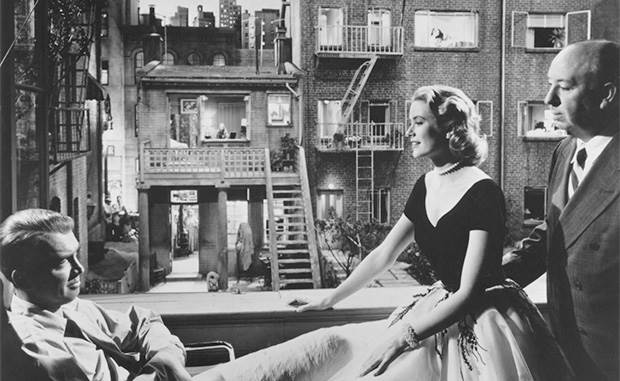
SUMMER:
Jaws
At the beginning of Jaws, Chrissie—the shark's first victim—sounds really happy to be going swimming. "Where are we going?" a clumsy, slow-moving frat boy asks her as they run down the beach at sunset. "Swimming!" she replies, practically singing the word. Chrissie obviously does not know the DVD chapter she is in is called "Chrissie's Last Swim". Chrissie, girl, you are going to DIE.
Dog Day Afternoon
Long before Al Pacino told us we could identify a 'Pacino script' by its coffee stains, and shortly after he starred in The Godfather, there was Dog Day Afternooon, a film about an armed robbery, a sex reassignment and a sweaty day in New York City. Al is intense, paranoid, and energetic, and it's based on a true story. All these years later the film still lives up to its tagline: "The Most Bizarre Bank Siege Ever".
Falling Down
Long, hot summer days can make tempers short and frayed. And sometimes it takes an ordinary man to express what we are all feeling on the inside. In Falling Down, this man is D-Fens, who, through the expressive power of rocket launchers, lets everyone know how frustrating the morning commute can be.
Rear Window
The natural thing to do during a summer heat wave is to watch thy neighbours. It was on one of those tablets Moses brought down from the Mount. So, this is what Jeff, wheelchair-bound and bored, does in Rear Window. He watches his neighbours and, through observing small moments in their lives, makes judgements about them. In between times he sweats, scratches, and witnesses the occasional murder. SUMMER DOES CRAZY THINGS, FOLKS.
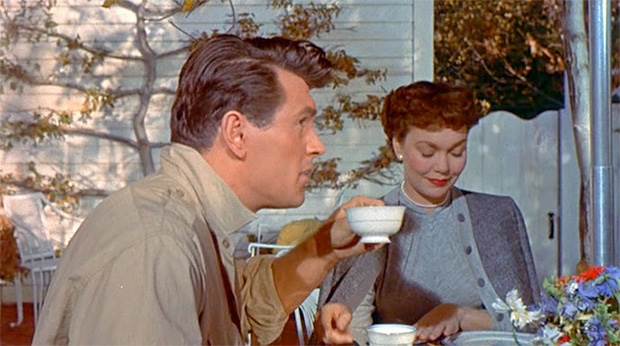
AUTUMN:
All That Heaven Allows
Douglas Sirk's All That Heaven Allows begins with a clock tower and autumn leaves. The symbolism is real subtle, but something tells me it has something to do with ... time, maybe? I am not sure. Anyhow, the film is wonderful and tells the story of a widow, Cary, a woman who, with two children at college, is in the AUTUMN OF HER LIFE (are you following me?) She falls in love with a younger man but society disapproves. But hey, you know what? Society sucks.
Far From Heaven
Todd Haynes's Far From Heaven also begins with a clock tower and autumn leaves. The symbolism is real subtle, but something tells me it has something to do with ... IT BEING A HOMAGE TO ALL THAT HEAVEN ALLOWS, MAYBE? And also, just so you know, I accidentally just typed "homage" as "homo-age," which is clearly some kind of unconscious reference to the movie.
Autumn Sonata
Ingmar Bergman was renowned as a relentlessly cheerful man and Autumn Sonata is no exception. The similarly named Ingrid Bergman is hilarious as a famed concert pianist who visits her daughter Eva after a seven-year absence. Liv Ullman is side-splitting as Eva, who obligingly tells her mother exactly what she thinks of her. Never before has family dysfunction been handled with so much humour, laughter, and comic lightness.
Halloween
Fact: When I was 18 I changed my ring tone to the theme from Halloween. Double fact: Every time my phone rang, I was too frightened to answer it. TRUE STORY. John Carpenter's slasher classic is set during everyone's favourite pre-Thanksgiving autumn holiday, and yes, the killer wears a William Shatner mask, and yes, some of it is super lame, but it's still an enormously effective film with a super-creepy score.
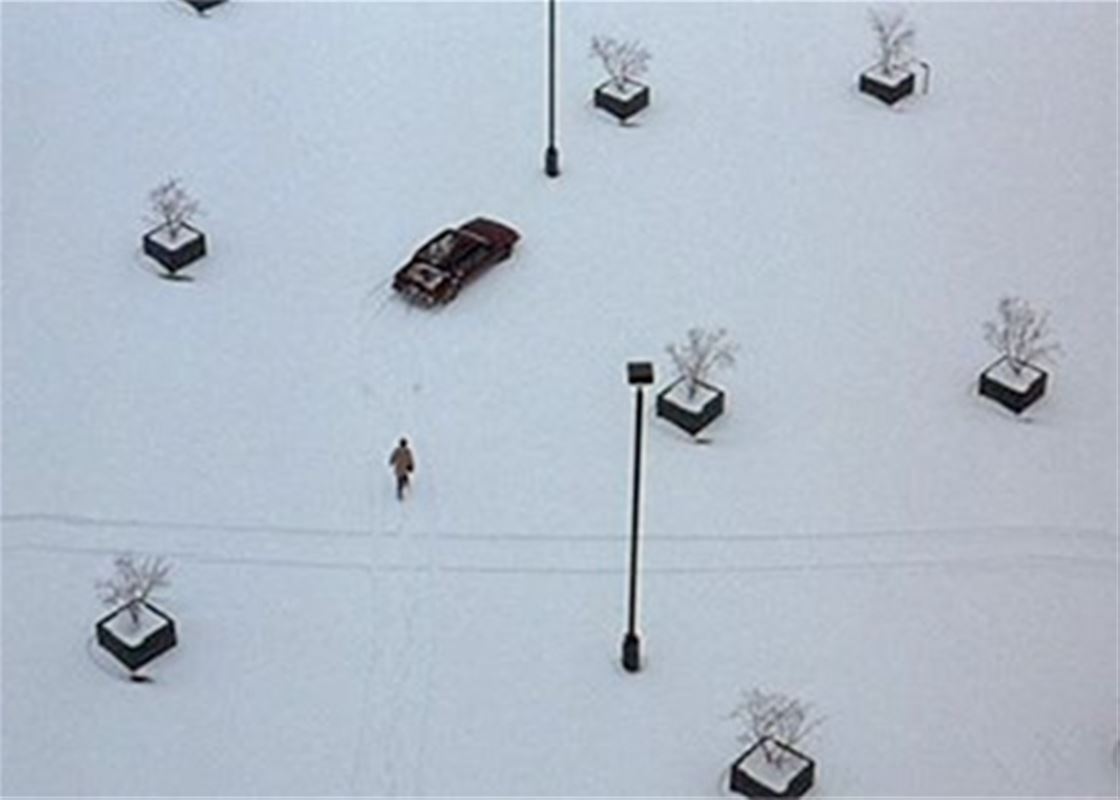

_(11)_(1).png&q=80&h=682&w=863&c=1&s=1)












.jpg&q=80&w=316&c=1&s=1)













.jpg&q=80&w=316&c=1&s=1)










